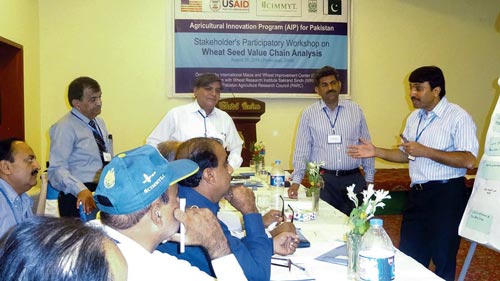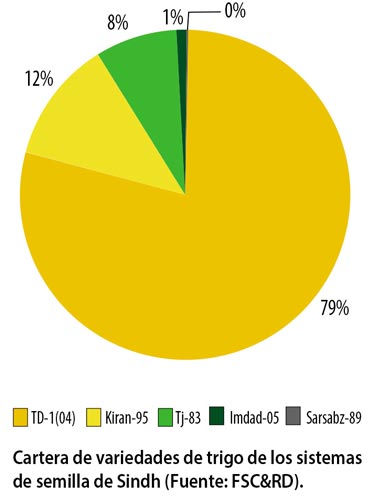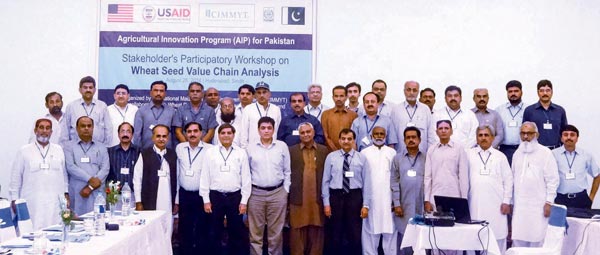Food insecurity is a persistent problem in Sindh, a province in Pakistan slightly smaller than Tajikistan and home to 42.5 million residents. Almost three-quarters of the population are subject to regular food shortages due to the stagnation of staple food production and pressures caused by a doubling of the population since 1999.

In an effort to address the food security challenges in the area, CIMMYT held a one-day workshop as part of the Agricultural Innovation Program (AIP) for Pakistan on 26 August in collaboration with the Wheat Research Institute and the Sakrand, Sindh and Pakistan Agricultural Research Council. More than 40 representatives vital to the wheat-seed value chain – including researchers, extension representatives, seed companies and the seed regulatory body of Pakistan – gathered in Hyderabad to analyze ways to transform wheat seed systems in the province.
The workshop was instrumental in revealing major opportunities and limitations across the entire spectrum of wheat seed systems, from breeding and releasing wheat varieties along with popularization and demand creation, to generating profitable and sustainable seed businesses.
On-farm evaluation of newly released varieties, Benazir 2013 and NARC 2011, indicated yield potentials 15 to 20 percent higher than existing varieties. If such varieties are made available and accepted throughout the region, food security could improve considerably due the varieties’ higher yield potential and rust resistance capability – traits critical to sustaining wheat productivity gains in Sindh.
According to the Federal Seed Certification and Registration Department (FSC&RD), only 31 percent of wheat seeds in Sindh are supplied by the commercial sector – public and privately owned seed companies – while 69 percent come from farmer-saved seeds.
Certified wheat seeds used in Sindh that are transported from Punjab province are not officially recognized in Sindh. If the unofficial transactions facilitating the flow of wheat seeds from Punjab are considered, this may indicate that wheat-seed systems in Sindh are fully functional and healthy.

However, this new batch of wheat varieties is not currently in the commercial seed production chain, so the average age of wheat varieties in Sindh indicates an unhealthy seed system. This is also illustrated by the predominance of the 10-year- old wheat variety TD 1 (Figure 1), the fact that wheat cultivars in the seed supply are, on average, 18 years old, and that two out of five varieties are more than 25 years old (Figure 1; Tj-83 and Sarsabz-89).
The Major Gap
The workshop identified a lack of coordinated efforts among those involved in the wheat-seed value chain to popularize new varieties as a significant weakness in Sindh. Weak coordination and linkages among research, extension, seed companies, the seed regulatory body and farmers has resulted in a very slow popularization of new varieties.
Many wheat varieties released in recent years have yet to reach farmers. This may be in part because the Sindh government’s Department of Agricultural Extension does not appear to have specific activities devoted to the publicity of new seed varieties.
More than 90 percent of certified wheat seeds in Sindh are supplied by private seed companies, which tend to focus on selling a few common wheat varieties with the highest market demand.
Deployment of new varieties in seed systems is slow also due to limited land and financial resources of research organizations. The lack of a regulatory framework allowing private seed companies to produce pre-basic and basic seeds is also a factor limiting the supply of adequate seeds.
Private seed companies said they recognized there is a lack of varietal choice – including short-duration varieties – and expressed interest in being involved in wheat variety development. However, they said they are limited by a lack of technical capability, financial resources, land and capital to develop research and development capacity.
Workshop participants identified a number of actions to incorporate into the AIP work plan for the upcoming wheat season, which begins in October-November. These actions include:
• Participatory varietal selection involving small-, medium- and large-scale farmers.
- Participatory on-farm demonstrations of new varieties with involvement of all major actors of the wheat seed value chain.
- Initiation of pre-basic and basic seed production by private seed companies with support from research, extension and seed regulatory bodies.
- Provision of new seed wheat varieties to landless and smallholder farmers in Sindh.

 Capacity development
Capacity development 
